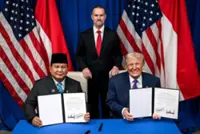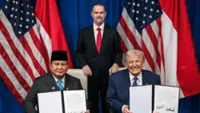AT the White House on Feb 4, US President Donald Trump told reporters the US should “take over” and redevelop the Gaza Strip with the help of Saudi Arabia, and Israeli Prime Minister Benjamin Netanyahu said he believes a peace deal between the oil-rich kingdom and Israel is “going to happen”.
The Saudi response was swift: reiterating Crown Prince Mohammed bin Salman’s demands for an independent Palestinian state as part of any normalisation agreement, and rejecting the “infringement on the legitimate rights of the Palestinian people” or “attempts to displace” them from their land.





